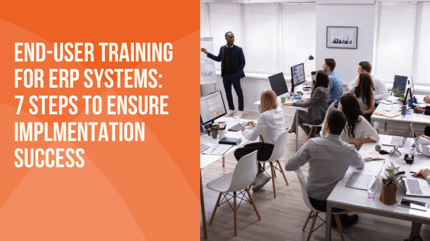End-User Training for ERP Systems: 7 Ways to Ensure Success
Chelsea Carter

ERP Systems can transform how an organization operates through improved communications, synchronized departmental operations, and the business intelligence needed to determine the direction of the company. But an ERP is just a tool. Without the people who use it, even the most advanced ERP is little more than an empty database because team members don't know how to use it.
An ERP implementation failure can sabotage a company's ability to bring to fruition the great expectations they have for the company after ERP implementation. For this reason, it's vital to have a plan to ensure implementation success, and that means having a clearly-defined strategy to teach end-users (your employees) how to effectively use ERP.
1. PLAN FOR A COMPREHENSIVE TRAINING APPROACH
When it comes to ERP training, organizations have many options, such as:
- Company-designed online course completion and resources
- Training a trainer who then trains someone in each department and each team
- Skipping the formal trainer and having designated people in each area become a department or team trainer
- Train front line employees in a classroom setting
- On-the-job training
- Hiring a training consultancy firm
No one approach may work throughout the organization, and a combination of methods may be required to support employee proficiency. It's essential to plan out this implementation strategy and calendar to avoid ERP implementation failure.
2. GATHER AND CREATE RESOURCES
An implementation company may have designed ERPs for thousands of businesses, but each implementation is unique, and broader vendor-provided resources may not fully represent how the end-user uses the ERP on a day to day basis.
The reasons for company-specific resources are many, among them:
- Employees need a single source of truth that is well-organized and searchable
- Existing employees or IT may need the information to troubleshoot any issues
- As new employees join the ranks, they too need a consistent manual that guides the learning process
For these reasons, organizations should consider adapting any vendor-supplied resources, specializing them to how employees will actually use the systems while recognizing that this may be unique to departments and teams. Bringing in representatives from each area of the company to collaborate and design educational tools will help an organization prepare for a more successful implementation.
3. MAKE IT RELEVANT
Human beings have limited memory storage capacity, and the memories that transition from short-term to long-term memory are not fully at a person's discretion, meaning we do not remember everything we learn. Instead, people remember what seems relevant to them, and subconsciously discard the rest. The more relevant and in-context ERP implementation training is, the more your employees will retain.
4. REDUCE STRESS
Studies have also shown that stress disrupts working memory, which is the ability to recall what someone has learned when they need to apply that knowledge. Obviously, stress is not 100% avoidable, and everyone experiences stress differently. Still, organizations can take steps to reduce stress levels during any ERP implementation through proper planning, rollout, training, ongoing support, and other implementation strategies. Employees will have the confidence to apply what they learned during ERP training in the real world in the weeks and months that follow, further preventing an ERP implementation failure.
5. COMMUNICATE THE WHY, THE HOW, AND THE WHEN
Business leaders understand the importance of communication in their organization. It is one of the many reasons to invest in an ERP in the first place, but this communication has never been more crucial than during ERP implementation. Everyone from leadership down to the front-line employees needs to understand why what may be perceived as a highly disruptive change is necessary to guide the company forward. They need to know not only how this may change the way business is conducted but also how this will improve things like:
- Workflow
- Inter-departmental communications
- Customer satisfaction
- Vendor relationships
- Organizational competitiveness
- The health of the organization, which generally equals more job security and promotional opportunities
And again, the more relevant leaders explain this "how" to each team, the better. Employees also need to know how ERP will be rolled out and the timelines (the when) to prevent ERP implementation failure.
6. DON'T SKIP EXPERIENTIAL TRAINING
Many employees will not retain what they are shown unless they have an opportunity to do it themselves, so creating opportunities for hands-on experience before go-live is crucial for success.
However, in many departments, employees "playing around" while practicing what they learned on live software would spell disaster. ERP training simulations and step-by-step eLearning tools allow employees to practice what they're learning in a mock setting, so they're more prepared when they work on the actual company software.
7. KNOW WHEN TO GET HELP
There is a strong correlation between a well-planned and executed training program and the success in ERP implementations, so it is worth noting that ERP training professionals may add tremendous value to the implementation of something so massive and impactful in nature. An ERP implementation failure could haunt a business for years, so exploring whether working with ERP training and implementation experts may improve the process.
ERP IMPLEMENTATION FAILURE AVERTED
Implementing a new ERP is a major undertaking regardless of the size of your organization, but with proper planning and investment in training of the end-user (your employees), you can ensure measurable implementation success and get the most out of your advanced ERP system for years to come.
When Manobyte helps your company integrate your HubSpot CRM with your ERP, it partners with key leaders in your company to personally train and develop repeatable training systems to make sure your teams are prepared to utilize this advanced technology to the highest degree possible. Let's connect to discuss your business goals.

